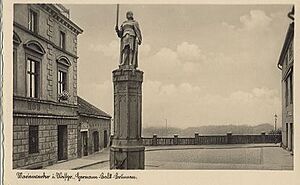Hermann Balk facts for kids
Quick facts for kids
Hermann Balk
|
|
|---|---|
| Died | March 5, 1239 |
Hermann Balk (died March 5, 1239, Würzburg) was an important leader of the Teutonic Order. He was the very first Landmeister, which means Provincial Master, for the Order in both Prussia and Livonia. Before that, from 1219 to 1227, he was the Deutschmeister in a region called Alemannia. Hermann Balk led the crusaders during the Prussian Crusade and became the Master of Prussia in 1230. For a short time, from 1237 to 1238, he also served as the Master of Livonia.
Contents
Hermann Balk's Life and Leadership
Hermann Balk came from a family in the Lower Saxon and Markish areas of Germany. He might have been a church official, called a canon, in Hildesheim before joining the Teutonic Knights. He was well-respected by other Catholics. He was a strong leader whose methods were copied by other masters for many years. His special seal, used to sign documents, was unique because it was the only one that showed his name.
Starting the Prussian Crusade
In 1226, the Teutonic Order was asked to help fight against the Old Prussians. These were pagan tribes who had been attacking the lands of Duke Conrad I of Masovia for many years. Hermann Balk led the first large group of Teutonic Knights to a castle near Toruń.
In 1230, it is believed that Balk made an agreement with Duke Conrad. This agreement, called the Treaty of Kruszwica, said that the Teutonic Knights would control Culmerland and any new lands they conquered. This was important because it meant the land would not go to the Duke or a bishop. A similar agreement had been made earlier by Emperor Frederick II in 1226.
Conquering New Lands
Hermann Balk was given the titles of Landpfleger and Landmeister. He led the Teutonic Knights during the first ten years of the Prussian Crusade, starting in the 1230s. During this time, they conquered areas like Culmerland, Pomesania, and northern Warmia.
The Teutonic Order's main goal was to protect lands in the Middle East. This meant Balk had limited resources for his campaigns. He used clever tactics like guerilla warfare and surprise attacks in forests. His cavalry, wearing white cloaks, were very effective in winter battles. Balk allowed tribes who accepted Christianity to join the Teutonic Knights as helpers and keep their lands. Tribes that stayed pagan were defeated. The crusaders used powerful weapons like ballistae (large crossbows) and smaller crossbows to capture the Prussians' forts.
Building Castles and Towns
Under Hermann Balk's leadership, many important castles were built. These included castles at Marienwerder (Kwidzyn), Culm (Chełmno), Elbing (Elbląg), Thorn (Toruń), and Rheden.
Balk also encouraged German settlers to move near these new castles. He and Grand Master Hermann von Salza gave special rights to the towns of Culm and Toruń in 1233. These rights became known as Culm law. This law was later used for other towns that grew in Prussia, helping them develop and become important centers.
Reorganizing the Livonian Order
In 1236, another German military order, the Livonian Brothers of the Sword, suffered a big defeat in the Battle of Saule. The remaining members of this order joined the Teutonic Order the next year. Hermann Balk was given the job of reorganizing these new knights. He brought sixty knights from northern Germany who spoke a similar language, Low German, to help.
Balk sailed to Riga and spread his troops out to strengthen the countryside. In 1238, at Stensby, Balk returned Danish Estonia to King Valdemar II of Denmark. This land had been taken by the Sword-Brothers. The Livonian knights were not happy about this and refused to work with Balk.
Balk then traveled to Italy to ask for help from Grand Master Hermann von Salza and Pope Gregory IX. However, he received little support. The Pope was in a disagreement with Emperor Frederick II, and Hermann von Salza died in Salerno. Dietrich von Grüningen was named Master of Livonia later in 1238. Hermann Balk himself died in Würzburg the following year.
Legacy
Hermann Balk is remembered for his important role in taking control of and spreading Christianity in the Chełmno Land. He is also seen as the true founder of the State of the Teutonic Order. His memory was very strong in West Prussia until the area became part of Poland in 1919. Many monuments and beautiful fountains in West Prussian cities were dedicated to him as the first Landmaster.


